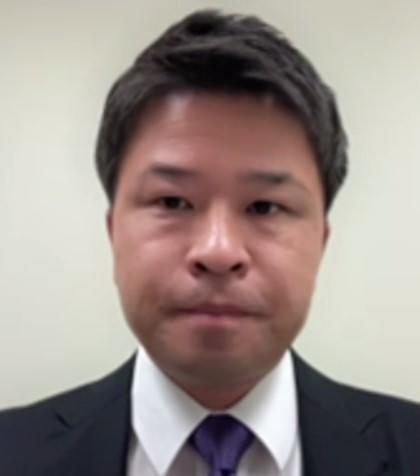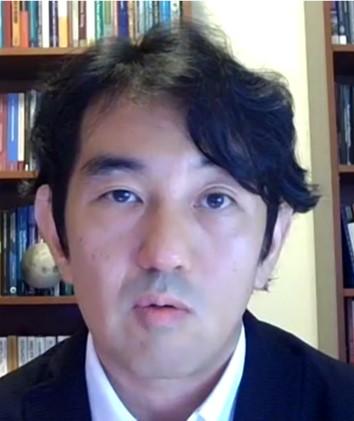International Cooperation for Enhancing Maritime Law Enforcement Capabilities in the Indo-Pacific Region: Capacity Building Efforts Through QUAD Collaboration Considering the Reactions of Southeast Asian Countries
- Colloquium
- International Activities
The 156th Transport Policy Colloquium -Washington Report XVII- (Online)
※Language:Japanese
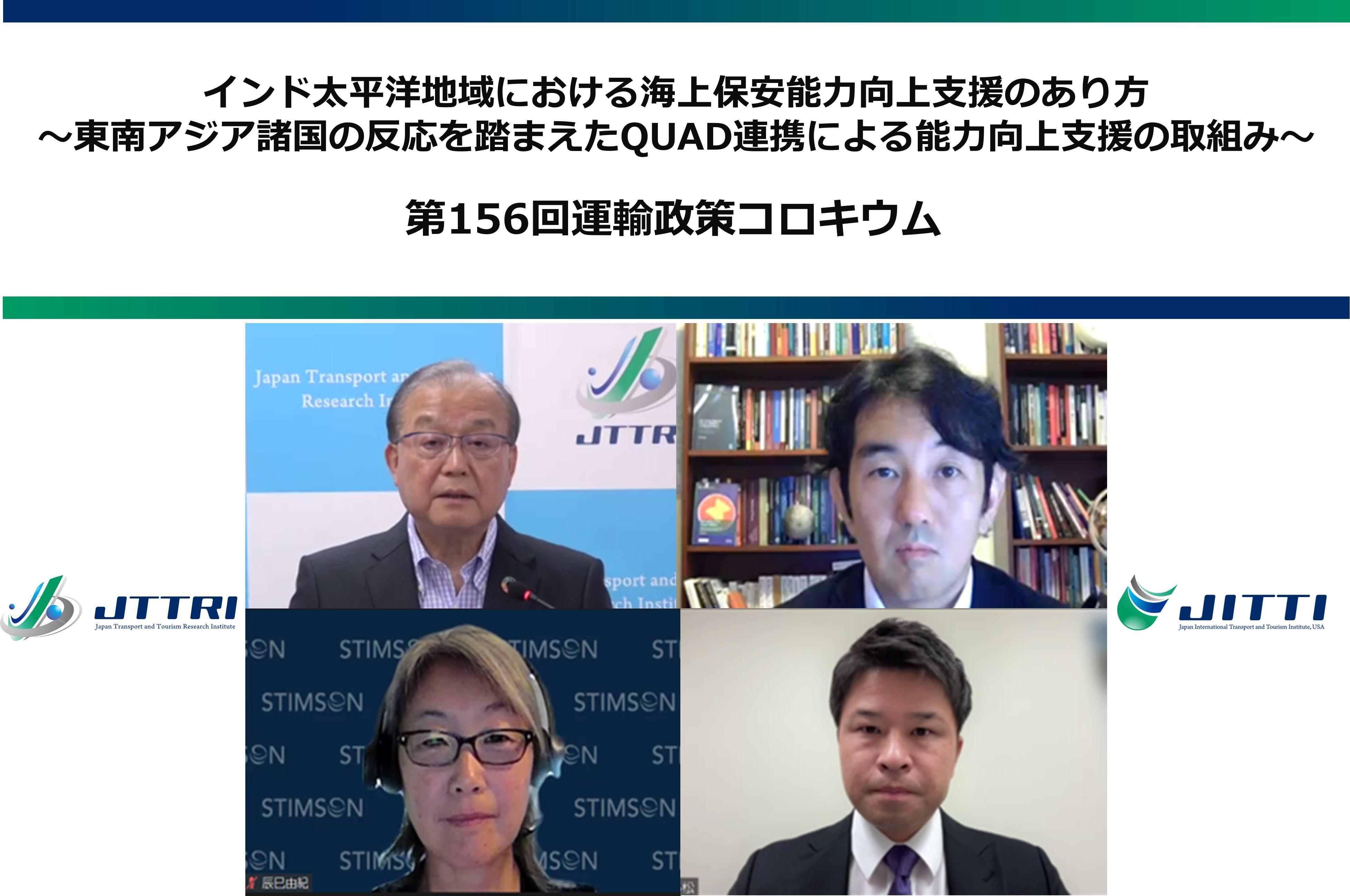

| Date / Time | Tue, Sep 12,2023 |
|---|---|
| Event Number | The 156th |
| Theme | Lecture and Comment KOMATSU Daisuke Maritime Security Analyst, Japan International Transport and Tourism Institute, USA(JTTI-USA) KOGA Kei Associate Professor at the Public Policy and Global Affairs Programme, School of Social Sciences, Nanyang Technological University (NTU) Discussion Cordinator TATSUMI Yuki Senior Research Fellow, The Canon Institute for Global Studies Senior Fellow and Co-Director of the East Asia Program and Director of the Japan Program, The Stimson Center |
Event Summary
As the national security situation becomes increasingly difficult, with ongoing issues including maritime encroachment by China, and the Russian invasion of Ukraine, the realization of a free and open Indo Pacific (FOIP) as advocated by Japan, is an increasingly pressing issue.
One high-profile initiative undertaken by the Quadrilateral Security Dialogue (QUAD) for the achievement of a FOIP is the provision of support to the nations of the region for capacity building in the field of maritime security. However, some nations in the region have remained reticent about receiving support from the QUAD due to factors including an economic reliance on China and the risk of being dragged into an adversarial relationship between the US and China.
At this colloquium, firstly, researcher Daisuke Komatsu presented results of research into the advantages and challenges of support provided, through collaboration with the QUAD, for capacity building in the field of maritime security. This was followed by a focus on the long years of support for capacity building in Southeast Asia nations provided by the Japan Coast Guard, with experts on this subject presenting their findings on the response of these nations towards capacity building support provided by Japan, or through cooperation between Japan and the US. Kei Koga, Associate Professor at the Public Policy and Global Affairs Program, School of Social Sciences, Nanyang Technological University (NTU), then commented on these findings. Following these comments, and with reference to US strategy for the Indo-Pacific, the discussion was broadened to cover the future of the relationship between Japan and Southeast Asian nations, with debate over potential methods for the provision of support for capacity building in the field of maritime security, including the possibility of coordinated support from members of the QUAD.


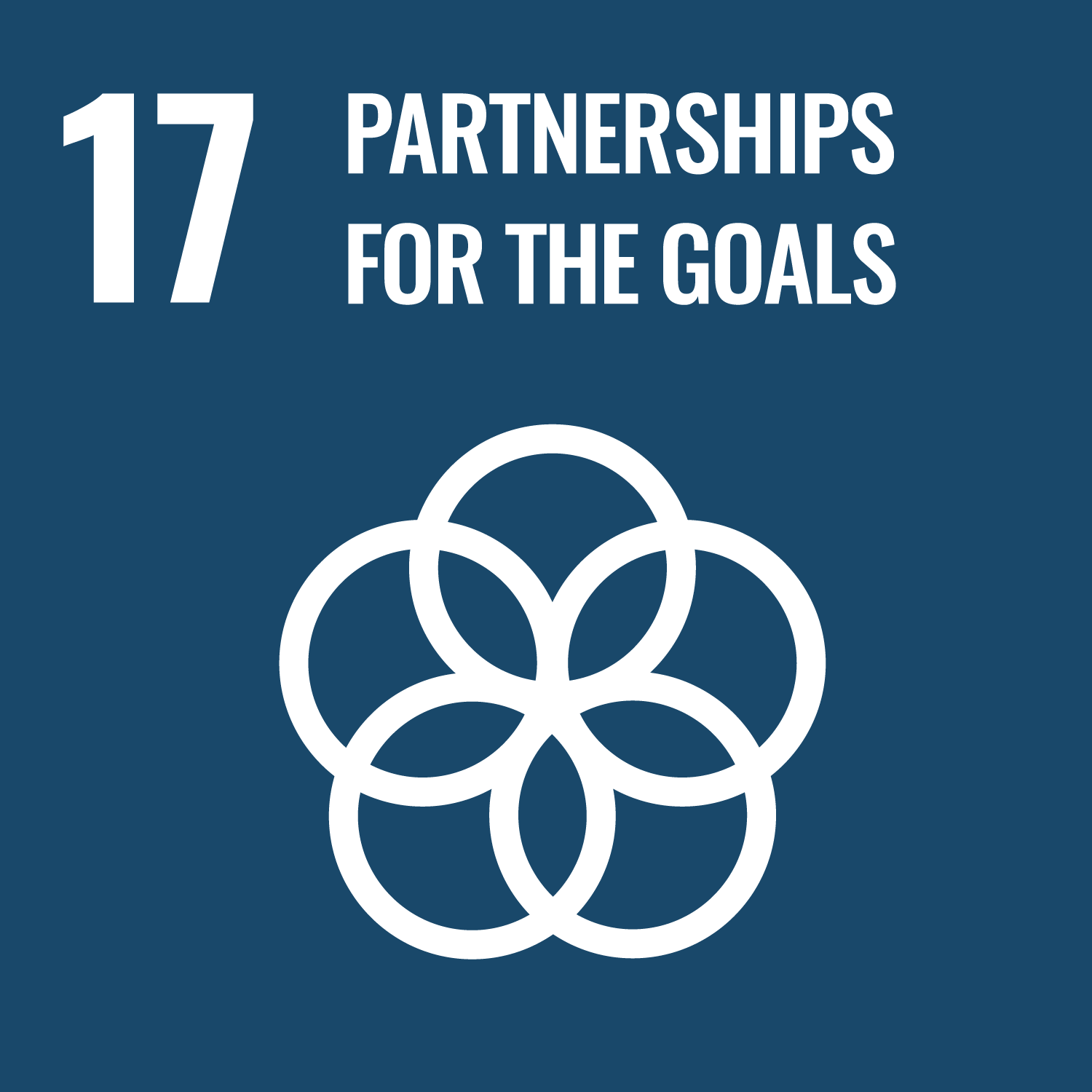
Program of the seminar is as the following
| Opening Remarks |
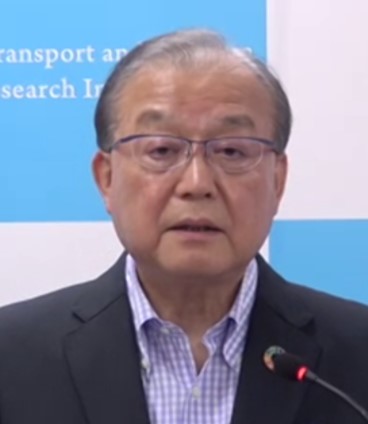
SHUKURI Masafumi, Chairman, Japan Transport and Tourism Research Institute (JTTRI) |
|---|---|
| Lecture and Comment | |
| Discussion |
Cordinator
TATSUMI Yuki Senior Research Fellow, The Canon Institute for Global Studies Senior Fellow and Co-Director of the East Asia Program and Director of the Japan Program, The Stimson Center 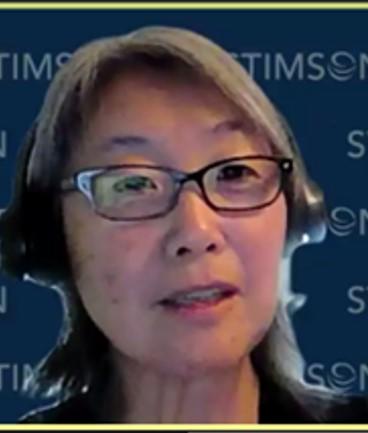 bio |
Outline of the seminar
Summary of Today’s SessionResearcher Daisuke Komatsu, of the Japan International Transport and Tourism Institute, USA (JITTI-USA) presented his research results on the theme of “International Cooperation for Enhancing Maritime Law Enforcement Capabilities in the Indo-Pacific Region: Capacity Building Efforts Through QUAD Collaboration Considering the Reactions of Southeast Asian Countries”.
Introduction
Support for capacity building within maritime security agencies in the Indo-Pacific region, delivered through collaboration between members of the Quadrilateral Security Dialogue (the QUAD: Japan, the United States, Australia, India), is effective means of achieving the common vision of the QUAD nations, namely the concept of a free and open Indo-Pacific (FOIP), as advocated by Japan.
Section 1: The growing severity of the maritime security environment
Maritime security in the Indo-Pacific region is threatened by various factors including unilateral attempts by China to change by force the status quo in the area around the Senkaku Islands and in the South China Sea, the Russian invasion of Ukraine, missile launches by North Korea, international terrorist groups, cyberattacks, and “gray zone situations” in competition between states.
Section 2: A free and open Indo-Pacific (FOIP)
In the Indo-Pacific region, the declining influence of the United States, the growing influence of China, and the rise of emerging and developing nations is producing a change in the balance of power between nations. In addition, as the “center of gravity” of the global economy shifts from the Atlantic to the Pacific, international relations are changing dramatically.
The countries of the Indo-Pacific are facing diverse range of threats including acts of piracy, IUU fishing, and smuggling. In the countries of Southeast Asia, unilateral attempts by trying to change the status quo continue, as do conflicts over maritime frontiers, and these issues threaten the maritime security of the region. However, the maritime law enforcement agencies in the region only have a limited capability to deal with these threats, and this lack of capacity is an issue.
With the above in mind, a vision for achieving a FOIP, that upholds the peace, stability, and prosperity of the region through economic and national security cooperation, was advanced by the late Japanese Prime Minister Shinzo Abe at Tokyo International Conference on African Development held 2016 (TICAD VI).
Section 3: Strategic security dialogue between QUAD nations
As a framework for achieving a FOIP, the QUAD, which is composed of the four nations of Japan, the United States, Australia, and India, nations surrounding the Indo-Pacific region and sharing various values including freedom, democracy, and the rule of law.
The QUAD has its roots in the coordinated assistance provided by Japan, the United States, Australia, and India following the Indian ocean tsunami that followed the Great Sumatra earthquake in 2004. In 2007, the then-Prime Minister Abe proposed coordination between the four nations, but Australia and India were reticent about this vision due to their concerns over the reaction of China and the importance of their economic relations with China. As a result, the framework was not put into practice. However, in 2016 and 2017, after Japan and the United States both published new Indo-Pacific strategies, Australia and India, which had both adjusted their respective positions on China, expressed agreement with Japanese and US strategies, leading to the restart of moves towards the QUAD vision, which resulted in the first foreign ministers’ summit in 2019, and the first leaders’ summit in 2021, events which culminated in the current arrangements.
The QUAD is not legally binding, and it is not an international alliance. Rather, through leaders’ meetings and other means, the QUAD seeks through flexible initiatives to promote the concept of a FOIP. The QUAD operates not only as a group of four nations, but also through bilateral and trilateral coordination, also cooperating with non-member nations under an inclusive multi-layered framework that allows multiple approaches.
The QUAD’s initiatives include projects on infrastructure, marine security, cybersecurity, and other issues, covering a diverse range, and in the field of maritime security, the QUAD has already established a track record activity including sharing satellite data and MDA data, building collaborative systems to provide humanitarian assistance and disaster relief. However, the QUAD has not yet commenced any substantive discussions over capacity building in the field of maritime security.
Section 4: The stance of nations in southeast Asia
Since 2016, when the QUAD clarified its Indo-Pacific strategy, the nations of Southeast Asia have responded with expectation over the QUAD’s ability to rein in China and growing concern over possibility of being tracked into between competition between the US and China. In response to those expectations and concerns, ASEAN nations published the ASEAN Outlook on Indo-Pacific (AOIP) in 2019, which stated that the fundamental principles of the FOIP were to a degree consistent with the formation of the international order in ASEAN, but that a FOIP [in the ASEAN region] must be based on the integrity and centrality of ASEAN and led by ASEAN, while rejecting the possibility of getting caught up in competition between China and the United States.
This statement demonstrated that cooperation between the QUAD and ASEAN must be built on the basis of mutual understanding and respect, and that if the QUAD is to make progress in promoting the concept of a FOIP, then support for capacity building in maritime security, an area which is both non-military and indirect, would be effective, although such moves would have to show respect for the diverse range of opinions and positions within ASEAN. In addition, it should be noted that there is a risk that, when providing coordinated assistance, negotiations and adjustments may produce differences in opinion or conflicts of interest which could delay decision-making processes or prevent agreements from being reached.
Section 5: Indo-Pacific diplomacy among the QUAD nations
All of the nations of the QUAD hold the common objective of achieving a stable and prosperous Indo-Pacific region, and stronger relations with ASEAN are key to those calls. However, each member of the QUAD prioritizes different sub-regions of the Indo-Pacific region, has complex relationships with China and other major powers, and also has unique diplomatic strategies. Cooperation within the QUAD therefore requires complex cooperation and coordination, with respect for the mutual differences between each nation, and cooperation towards common, shared goals will lead the stability and prosperity of the region.
Section 6: Maritime security agencies in the QUAD nations
Each of the maritime security agencies operated by the nations of the QUAD differs in the date of its establishment, presiding organization, military/civilian characteristics, size and other factors, as well as differences in the nations to which they tend to provide capacity building assistance. In order to achieve a FOIP, cooperation between members of the QUAD will be most effective if it takes account of these differences and characteristics.
Section 7: Frameworks for support for capacity building through collaboration within the QUAD
Proposal 1: Two-tiered support that considers the status quo in Indo-Pacific nations
Maritime security challenges can be divided into those that all of the Indo-Pacific nations share in common, and those which are specific to the nations of Southeast Asia. It is effective to address these issues separately in a two-tiered approach. For common issues that affect all Indo-Pacific nations, issues which have traditionally been addressed by maritime security agencies, support can be provided to improve their fundamental capacity regarding both “hard” [infrastructure, equipment] and “soft” [knowledge, skills] capacity. On specific issues that affect Southeast Asian nations, expert knowledge and practical skills and experience can be shared by the Japan Coast Guard based on its experience responding to issues around the Senkaku Islands, including promotion of knowledge and wider awareness of international law, assistance that can help maritime security agencies in Southeast Asia nations respond in accordance with international law while avoiding conflict and protecting sovereignty.
Proposal 2: Mutually complementary support that leverages the characteristics of each maritime security agency in the QUAD
When maritime security agencies operated by members of the QUAD provide support for capacity building, differences in the organization, vessels, and equipment of the country receiving the support can result in mismatches in the support provided, and personnel and resources shortages, as well as budgetary restrictions, can result in a failure to provide assistance, producing in gaps where assistance is lacking in the Indo-Pacific area. To address this, members of the QUAD should cooperate together to provide support that is consistent with the organizational structures, vessels and equipment of the receiving nation, focusing on areas in which the maritime security agencies operated by the QUAD have expertise, allocating the nations to receive support appropriately, and dividing resources to ensure that the QUAD support reaches all areas without creating any gaps in the area, while also ensuring that the unilateral support provided by each QUAD member is mutually complementary.
Proposal 3: Establishment of QUAD Maritime Security Agency Strategic Talks (tentative name: Q-MAST)
It is proposed that coordinated assistance provided by the QUAD be facilitated by the establishment of the QUAD Maritime Security Agency Strategic Talks (Q-Mast), a forum for discussing the measures required for coordinating assistance. Q-MASTwould address issues including the two-tiered support consistent with the status of various Indo-Pacific nations (Proposal 1), mutually complementary support that leverages the characteristics of each nation in the QUAD (Proposal 2), and also make the necessary arrangements for coordination with other allied nations outside the QUAD. Given the wealth of experience that the Japan Coast Guard has in cooperating together with a USCG to provide capacity building support in diplomacy and maritime security, it would be appropriate for the JCG to take the lead in preparing for the establishment of Q-MAST. However, administrative arrangements will be important as the issue of operating expenses could produce an asymmetry of information that may result in misunderstandings or concerns.
Proposal 4: A multi-layered approach that leverages the characteristics of the QUAD and allows multiple approaches
By focusing on the flexibility of the QUAD, including its multi-layered nature which allows multiple approaches, it is possible to combine two-tiered assistance (Proposal 1), mutually complementary assistance (Proposal 2), and the establishment of Q-MAST (Proposal 3) to achieve a FOIP.
Specifically, Q-MAST can be leveraged to combine the two-tiered support provided through coordination between Japan and the United States with mutually complementary unilateral support provided by Australia and India, so as to deliver coordinated support through a varied, multi-layered approach.
Discussion panel member Kei Koga, Associate Professor at the Public Policy and Global Affairs Programme, School of Social Sciences, Nanyang Technological University, Singapore, provided the following comments and explanations on each section of Daisuke Komatsu’s presentation.
Section 1: QUAD collaboration over the provision of support for capacity building in maritime security
I agree that coordination between the maritime security agencies of the QUAD members is an extremely effective way of supporting capacity building. That is because providing coordinated support will also lead to stronger ties between the members of the QUAD, because this is a field that is, politically speaking, relatively easy to work in, and because it is also a field where it is relatively easy for the recipient country to accept assistance.
Section 2: Issues with QUAD collaboration
Issues affecting preparation in the QUAD include different approaches and budgets for capacity building assistance, as well as differences in accounting year, and differences in the organizational structure of the maritime security agencies in each QUAD member. While these issues can make coordination difficult, I agree that the establishment of Q-MAST as a forum for handling these arrangements, as proposed by Mr. Komatsu, would be extremely effective for finalizing the details of assistance provided and also for exchanging information.
When coordinating with maritime security agencies in emerging and other nations, one issue is that communication in English is required, and as this can make it difficult to transfer knowledge and technology, one way to engage in solving the language issues is to involve not only governments in the cooperation, but also universities and research institutions.
In addition, while the QUAD is important, it is not the only platform, and given that the goal is to achieve regional stability, bilateral and trilateral cooperation is also possible. Wider support can also be provided in other ways, such as the cooperative meeting between Japan, the US, Australia and then also the Philippines which took place during at the Shangri-La dialogue in June this year.
Section 3: Debate over a free and open Indo-Pacific and its development
A fFOIP is an advanced concept, but rather than think of it as a concept that will always continue in exactly the same form, it should be thought of as a concept that can change according to the international circumstances.
However, when Japan announced its Indo-Pacific strategy in 2016, the specific policies and the countries with which Japan intended to coordinate were left ambiguous, with, in particular, no particular reference to ASEAN and the Southeast Asian nations that are at the heart of the Indo-Pacific region. Later on, after ASEAN expressed some concerns to Japan about the strategy, the strategy was modified to stress the centrality and integrity of ASEAN, and the expression of strategy was replaced with concept. Japan then announced as a new vision, which recently, under Prime Minister Kishida, includes four principal initiatives. This is an agenda that the countries of ASEAN now approve off, as they are now included in the approach.
Section 4: The relationship between the QUAD and ASEAN
If you look at the maps shown on the website of Japan’s Ministry of Foreign Affairs between 2016 and 2020, you can see the evolution of the Indo-Pacific strategy. In 2016, the maps center around the Indian ocean, now the maps center around both the Indian and the Pacific oceans. Later on, as the foreign ministry came to place more emphasis on ASEAN, now you can see that map center on Japan and encompass the whole Asia Pacific region.
When it was first announced, the nations of Southeast Asia tended to view the QUAD as a framework for containing China, and they kept their distance from it, but recently they view the framework more favorably. The reason for that is the construction of framework such as AUKUS and IPEF have reduced the military and economic aspects of the QUAD, leaning the QUAD further towards the nontraditional security fields that ASEAN tends to prefer. In addition, members of the QUAD cooperated to develop and distribute vaccines, allowing the ASEAN nations to perceive the QUAD as more of a framework for the provision of public benefits, rather than of framework that could involve them in an anti-China strategy. In this environment, Japan can play a role in building cooperative relationships between the QUAD and ASEAN.
Section 5: The QUAD in Southeast Asia and the influence of China
From the perspective of trust within the region, Japan is the region’s most trusted nation. Distrust over the US within the region grew during the Trump government, but recently the US is starting to be perceived as a trusted partner. Trust in India and China is not very high.
In terms of economic influence, China ranks highest, although recently there is a trend towards decoupling or de-risking from China, and concerns are growing over economic relations with China.
In terms of political (military) presence, again China is ranked as having the greatest influence, followed by the United States, and these two nations are key to the stability of the region.
As we can see from this data, it is the United States and China that are far ahead of the other nations in terms of economic and military influence. Japan, from the perspective of Southeast Asian nations, is neither an economic nor a military threat, but it is considered a trusted nation. Therefore, for Southeast Asian nations who may, due to their relationship with China, find it difficult to gauge an appropriate distance from the United States, Japan can play a role in mediating the US policy.
A discussion question and answer session with stand lead by coordinator Yuki Tatsumi, senior research fellow at the Canon Institute for Global Studies (CIGS)
Question 1:
Discussion on security policy under the Kishida government and the role of the Japan Coast Guard
From the Kishida government’s unique Indo-Pacific vision, and through the national security strategy announced in December 2022, we can see that Japan’s Indo-Pacific policy, particularly Japan’s policy with regard to the QUAD, is changing since the end of the Abe government. Specifically, since the release of the national security strategy, Japan has increased the proportion of GDP it spends on national security to around 2%. This is a budget that includes a figure that includes the budget for maritime security. And even though the budget is expected to increase, and even though we can see from the details of the announcement, and from the declaration, that the government is making firm policy changes in areas where the Coast Guard can continue to expand its role, don’t you think that these moves are still insufficient?
Mr. Komatsu
For example, when the Japan Coast Guard takes part international corporation, patrol ships used for Japan’s maritime security and safety are dispatched to the country receiving support. During these missions, the boats are not involved in their usual duties around Japan. However, couldn’t an increase in budget allow the construction of patrol ships specifically for the purpose of international corporation, and the construction of dedicated structures rooted in work for the international community?
In addition, Japan recently announced integrated controls that include placing the Japan Coast Guard under the control of the Defense Minister in times of emergency, and we expect to see an acceleration in the seamless coordination required under such circumstances. Further, when dispatched to provide disaster relief, I would expect to see Japan’s Coast Guard working together with the militaries of the other nations.
Associate Professor Koga
I agree that the focus of Japan’s Indo-Pacific vision has changed to a certain degree under the Kishida government. One example of this is that Japan’s presence in Southeast Asia is relatively lower than it was previously. For example, due to developments such as the war in Ukraine, it has become harder to see Japan’s strategic vision for ASEAN and Southeast Asia, although that isn’t necessarily something that we need to look at entirely negatively. At the same time, Japan is still working to place a priority focus on Southeast Asia under the theme of “collectivity”, and as we move forward, one important issue is the type of cooperation that Japan can provide in the field of security.
When it comes to assistance for capacity building in maritime security, while the countries of Southeast Asia are extremely welcoming of both support for infrastructure and equipment and also for knowledge, skills, and systems, I am hearing specific requests for patrol ships. These ships are considered high quality, and ASEAN wants more of them. It is an extremely difficult issue, but if it can be handled skillfully then it can lead to stronger ties and greater trust.
Question 2: Discussion on the limitations on the Japan Coast Guard that result from its non-military nature
When we compare the maritime security agencies of the QUAD nations, we can see that only the Japan Coast Guard is completely non-military and therefore the Japan Coast Guard is more restricted in its activities than the other agencies. Given this situation, what is the best way to move forward when trying to harness the know-how built up by the Japanese and US maritime security agencies to enhance the capacity of the whole QUAD to provide assistance for capacity building?
Mr. Komatsu
As the Japan Coast Guard is essentially a police organization, it uses the capabilities of its “white ships” to respond to gray zone situations in the seas around Japan. If these ships were to be militarized, then this would immediately produce a risk of transforming gray zone situations around Japan into military situations. Therefore, at the moment, the Japan Coast Guard’s status as a police organization is playing an extremely important role.
With regard to the conflict over maritime frontiers in the South China Sea, and China’s unilateral attempts to change the status quo through gray zone activities, an issue that the Southeast Asian nations are currently facing, resolution of the issue grows increasingly difficult the more the situation is militarized.
In addition, maritime security organizations exist primarily for the purpose of protecting a nation’s sovereignty in its territorial waters and exclusive economic zone. Therefore, due to the possibility of infringement of another nation’s sovereignty when maritime security organizations enter into the territorial waters of other nations to conduct certain duties, it is important for us to deliver assistance in a way that raises the capacity of Southeast Asian nations to address these issues autonomously.
As such, while the Japan Coast Guard does not have military characteristics, I do not, from the perspective of joining other members of the QUAD to provide assistance for capacity building in other nations, see this as a restriction. Rather, I see it as beneficial diversity.
Associate Professor Koga
I do think that the difference between the nature of these organizations does pose certain restrictions, but I don’t think these restrictions will have too much impact on Japan’s capacity to assist our ability to assist in capacity building. There is no need for the Japan Coast Guard to work directly together with foreign militaries, and there is much that maritime security organizations can do in terms of raising awareness among other maritime security organizations of related international law and improving their capacity to act autonomously.
On the other hand, in fields other than providing support for capacity building, for example disaster relief and humanitarian assistance, we do need to think about the extent to which the Japan Coast Guard can build cooperative relationships with overseas militaries when other countries are sending their militaries to provide assistance.
When making these arrangements, I agree that we will need a forum for dialogue such as the Q-MAST forum proposed by Mr. Komatsu. Q-MAST would provide a core for accumulating information, which would allow the expansion of corporation on a basis of a clear mutual understanding of what can and cannot be done.
Question 3: Discussion on assistance for Pacific Island nations
During the presentation, we saw a visual representation of how the various members of the QUAD focus on different respective areas of the Indo-Pacific, and we could see that the greatest overlap was between the areas of interest of Japan and the United States, while the area covered by India includes areas only of interest to India, and the area covered by Australia includes areas only of interest to Australia. Currently, a battleground for influence between China and the United States is gradually shifting toward the island nations of the Pacific, where Australia has put the strongest emphasis on. When we consider the island nations in the Pacific as a new venue for possible cooperation between members of the QUAD, and look at this from a maritime security perspective, how do you think Japan, or perhaps Japan and the United States, should approach these issues?
Mr. Komatsu
In the past, Japan Coast Guard has mainly provided assistance for capacity building in Palau. In addition, through the support of the Japan Foundation, patrol ships have been provided to nations including Palau, Micronesia, and the Marchall Islands. Network, even if the focus of coordinated assistance from the QUAD shifts towards Pacific Island Nations, Japan already has a track record in this area.
In addition, as one of the initiatives of the Indo-Pacific partnership on MDA, which is designed to provide MDA information to Pacific island nations, local maritime security agencies will also likely benefit from the collaborative work of Japan, the US and Australia to provide support for capacity building on MDA data use for maritime search and rescue and measures to combat IUU fishing.
However, the management security agencies of Pacific island nations have limited human resources, and Japan could consider not only providing assistance for capacity building to improve their capabilities, but also providing support through patrols on behalf of those nations.
Associate Professor Koga
Recently, while India’s agenda does include a focus on the global south and it is strengthening its policy of involvement with developing nations, the greater interest in the Pacific Island nations lies with Japan, the US, and Australia, so perhaps a trilateral framework is a more appropriate means of providing assistance to Pacific island nations, rather than the entire QUAD.



